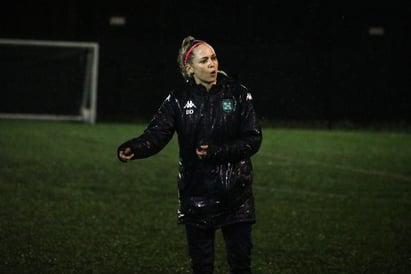Search the latest and greatest job opportunities in sport
Deborah Dilworth, the Head of Women’s Football at the Football Supporters Association, and an alumna of the University of Liverpool’s Football Industries MBA, speaks about her passion for football from a young age and her experiences as a woman working in the football industry.
How did you get into football, were you aware there was a pushback from a young age that this isn’t typically a woman-dominated industry? 
I started playing football in primary school with the boys – my participation was minimal as the perception seemed to be that the girls were not to play. At home, however, I developed into a supporter of Preston North End quickly and started to attend football matches with my dad and eldest brother at the start of secondary school.
At this time, I also started to play more structured football with my closest friend Fran. We often got a lot of questions from males around why we played football - although the questioning was sometimes out of interest rather than criticism - this always seemed odd to me when the three men closest to me (my dad and two brothers) were so encouraging in my enjoyment of the sport.
Pushback persists today and some of this is based on outdated policies - reflecting on my time working in football, I have often been the only woman in the room outside of playing. I think this is changing slowly but I still feel there is a lot of work to do particularly around who is in room when decisions are being made.
What are the most exciting developments and opportunities for women in the football industry in the coming years such as the 2035 Women’s World Cup - how would you like to see the game viewed by then?
The growth of opportunities for women in the industry and how they challenge old archaic systems is a positive development that I hope to continue. There’s more unity and connection with women in the industry than ever before (thanks to organisations like Women in Football)..png?width=1516&height=359&name=Email%20Banner%20(9).png)
By 2035, I’d like to see the game either referred to as 'football' without the women’s label tagged on front, or for stakeholders across the game to refer to ‘men’s football’. I’d also like to see teams globally being properly funded and supported by the national governing bodies.
It is imperative to the growth of the game that we see supporters be properly embedded into every level of the game globally and be part of key decision-making processes. More brands and sponsors will hopefully support women's football, but this has to come with a recognition of its uniqueness. Part of this will be a responsibility from everyone in the game to preserve the welcoming and inclusive environment that is established and continue to ensure this is the case.
You studied the Football Industries MBA at the University of Liverpool Management School. How has this helped your career?
The Football Industries MBA gave me a new level of critical thinking and consideration for football as a global sport. It provided a platform to showcase skills and the opportunity to learn new ones. It also provided the opportunity to consider what part of the football industry I might like to move into next as well as an ability to connect with so many brilliant individuals.
Are there any standout moments or achievements from your career in the football industry that you are particularly proud of?
There are a few that spring to mind, graduating and achieving a distinction in my MBA despite circumstances was a feat I’m proud of. Creating a formal and constituted women's game network for the Football Supporters Association and helping this grow into a respected group across the women's game has been a joy. In addition, becoming an FA mentor and receiving an 'Above and Beyond' award at the national conference and most recently achieving my UEFA B License.
How important do you think networking and building relationships are in the football industry, and what strategies have you used to expand your professional network?
Networking and building relationships in football are extremely important, it is a small industry despite its size. Networking isn't important because of what you can gain from it, it is important to consider what you can give. One of the reasons why I really like the women's game is because the spirit of collaboration is so high and this to me is what networking is about.
In terms of strategies, I try to give myself as many opportunities to attend events, listen to webinars and to discuss football with new people so that I learn and expand my views all the time.
Think about what you can give, and you won’t be far off the right track.
Discover how a Football Industry MBA from the triple-accredited Management School can help you to develop the skills you need to lead effectively in football or sports organisation.
Tuesday 6th February 2024, 4.30-7pm, Brett Building, University of Liverpool.
Find more great articles to learn about the sports industry on our Learn: Knowledge Hub
Search the latest and greatest job opportunities in sport
One of the many key success factors when assessing the quality of degree programmes is the employability rate of its gra...
Read moreThe global major event industry is one of the most thrilling and impactful career paths you can choose. If you’re lookin...
Read moreStarting his career in New Zealand within sports events, Regan gained valuable experience with Hockey New Zealand and Ne...
Read more